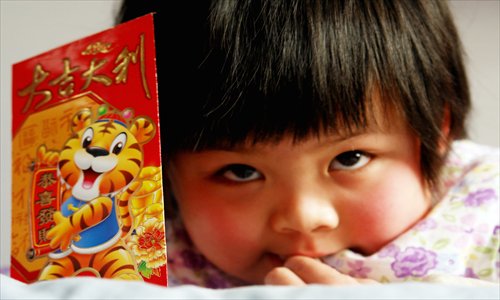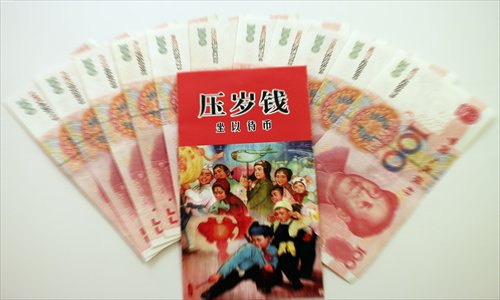Festival of cash
When 10-year-old Xiaojun (pseudonym) walked into a supermarket flashing the stack of bills he had been gifted during Spring Festival, he probably meant to impress his friends. When four kids began to pummel him instead, Xiaojun received a sharp lesson in humility.
The scrap was stopped by a cop in his hometown of Shijiazhuang, Hebei Province and Xiaojun escaped largely unscathed. "It is dangerous for a kid to be carrying so much cash," a local police officer surnamed Shi told the Global Times, adding that parents should think twice before giving children so much money.
The 4,000 yuan ($641) Xiaojun got from his family and friends was delivered in the form of hongbao, red envelopes that serve as a traditional gift containing a small amount of money inside and given to children during Spring Festival.
As an ancient custom, putting hongbao under children's pillows is based on an old belief that spirits may walk abroad at the turn of the year and that the lucky money will protect children. With increasing amounts of money in the red envelopes, hongbao are causing children to be given too much money while for adults, presenting hongbao with small amounts inside can cause them to lose face.
As a result, for most families, money has become a feature of the greetings and reunions during China's traditional family festival.
Not the face
A survey by research firm TNS, among 5,000 Chinese people, showed that 45 percent of respondents most desired money as a New Year's gift with the average amount to be given out per person standing at around 3,668 yuan.
"The hongbao to my niece and younger cousins are to show my relatives that I actually made money away from home," Lu Mei, 22, a migrant worker in Shenzhen but hailing from a village in Hunan Province, told the Global Times. "It is quite a burden," said Lu, who spent 3,000 yuan, nearly one month's salary, on hongbao.
Most young people in Lu's village who went to work far away must flash the cash when they return to show they made the right decision by leaving. Each kid in her village can expect to receive at least 1,500 yuan during the vacation. But that amount is trivial comparing to the family that Lu was babysitting for in Shenzhen.
Zhong Hua, Lu's employee, presented 21 red envelopes worth a total of 7,300 yuan while her son received 30 hongbao worth over 20,000 yuan.
To show generosity and courtesy, not only family members but also friends give hongbao to each other's kids at New Year's greetings, involving many calculations.
"A principle is that when your kids receive hongbao from friends first, you'd better give more than they did, otherwise they will think you impolite and miserly," Zhong said.
Losing face is a taboo even in front of children. "I used to give them 100 or 200 yuan but now I cannot because my child's friend receives at least 600 yuan," said the mother of one graduate student.
Traditionally, the custom did not involve real cash and parents would give children memorial coins signifying good luck.
"But the habit evolved when there was only one child in a family and as income levels rise, the one child is expected to enjoy the fruit of parents' hard work, so parents tend to give more," Xiao Fang, a professor of sociology from Beijing Normal University, told the Global Times.
Something for nothing
Watching her 2-year-old son, unable to really speak but still clapping happily at the sight of the red envelope and pink notes, Zhong feels a little worried.
"When I see him cheering when relatives visit, I hope he is really happy to see them, rather than the red envelopes prepared for him," Zhong added.
With all this cash burning holes in their pockets, kids could buy things without a plan and take the festival as a chance for collecting money, said Xiao.
One boy, whose father is a small-town official, grew frustrated after his father went into hiding in order to avoid receiving unwanted gifts or bribes, as it also meant he could not receive many visitors to give him envelopes, as Beijing Evening News reported Saturday. In response he revealed the date his father would return home, resulting in the desired flood of gifts. The boy even refused to tell his father how much he got.
"This kind of expensive hongbao is not only another form of bribe, kids are used and spoiled during this process," Sun Yuxiao, a clinical psychologist from Beijing Spiritual Counseling Fraternity, told the Global Times. "Children will think that money can be made without any hard work and that as long as you are an official, people will shower you with riches," said Sun.
Xiao, 50, recalled that when he was a boy living in the countryside, he would get only one or two yuan during the festival. "Kids like me did not have many sweets at that time and we were touched by our parents who made little money but still gave us envelopes." "Happiness could be bought with little money then. But today's kids are hard to please. They do not play outside during the holiday but like to wait at home for the cash to flow in," Xiao said.
To correct the tradition
In Hong Kong and Singapore, people have maintained the custom. However, they differ from the Chinese mainland, as a hongbao usually contains a very small sum of money ranging from HK$10 ($1.29) to HK$50.
According to the TNS survey, Hong Kong people spent a similar amount of money on hongbao as mainlanders while people from Singapore would spend twice that amount. But they would give them to almost everyone they encounter, including security guards and cleaners during the 15-day festival.
"When a large amount of money is involved, the festival will become materialistic but when people receive less, the meaning of this custom can be valued more," Wang Xiaoyu, a cultural expert from Tongji University in Shanghai, told the Global Times.
Wang said if parents have to give so much money to kids, they should teach them how to manage the money and remind them about the blessings of the festival.

